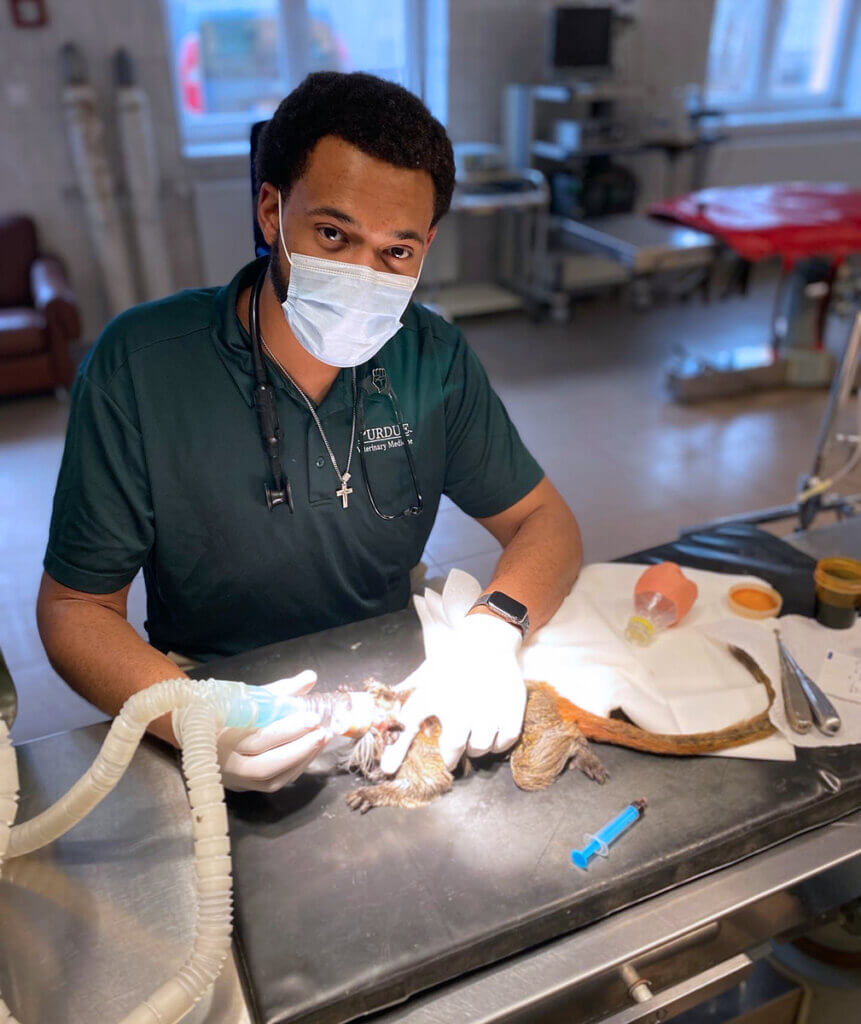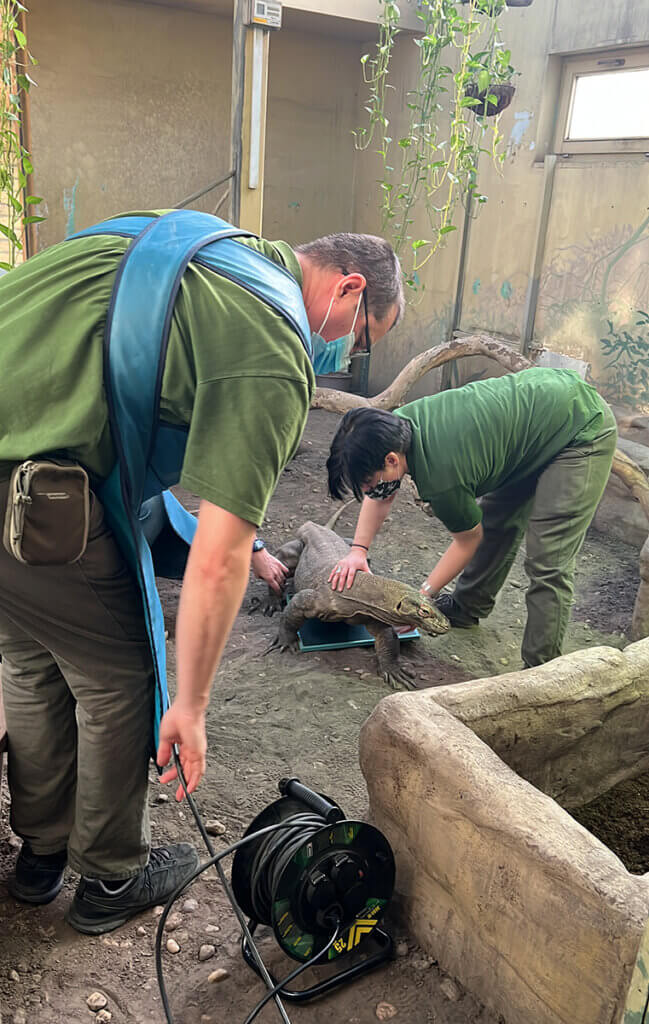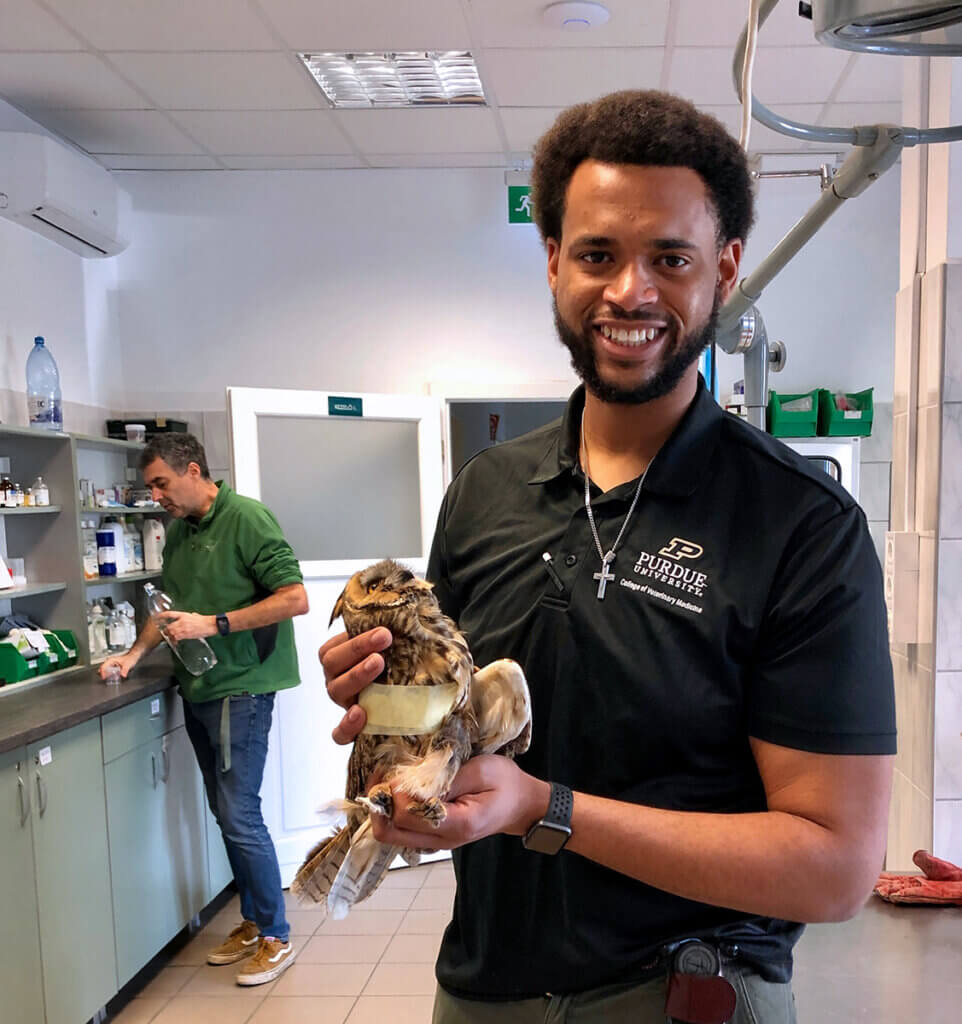
Senior Purdue DVM student Floyd Williams, Jr. took giant leaps towards his career goals this past year by studying abroad in Budapest, Hungary, where he participated in an externship at the Budapest Zoo that would change his life. His travel also marked a milestone for the college as the first international externship experience for a Purdue veterinary student since the pandemic shut down study abroad opportunities in 2020.
Floyd’s study abroad journey actually began in 2019, when he spent four weeks in Central Europe working with veterinarians and biologists in zoological conservation and exotic pet medicine through a faculty-led course by Dr. Steve Thompson, Purdue clinical associate professor of small animal primary care. While studying at the Budapest Zoo, Floyd was able to attend the annual Zoo4Nat Wildlife Conservation Conference, where attendees were informed of current projects and efforts in wildlife medicine today. After spending just one week at the zoo with Dr. Endre Sos, lead veterinarian, and witnessing his dedication to wildlife, along with his amazing team of veterinary technicians, zookeepers, and staff, Floyd couldn’t help but ask for an externship. In response, Dr. Sos invited him back for an unlimited stay.
Floyd was born in Ft. Lauderdale, Florida and raised in San Antonio, Texas. He enjoys hiking, fishing, reading, meditating, FaceTiming his family, and recently, scuba diving. While in high school, Floyd chose a criminal justice academic track with the intent of becoming an advocate for abused and neglected animals. But then he transferred to Judson High School in Converse, Texas, and not long after, opted to switch tracks to pursue veterinary/animal science and joined the local FFA chapter. His decision was influenced by his high school advisor, who suggested that he take the veterinary medicine science course offered his sophomore year. He enjoyed it so much he decided to pursue his Veterinary Assistant Certification (CVA). To gain a CVA, one must obtain 500 hours of in-hospital experience, completing about 100 skills under the supervision of a DVM or LVT before qualifying for the state exam. On the way to earning his CVA, Floyd found fulfillment in advocating for his patients’ health and care and realized that veterinary medicine is his calling.
The opportunity to advocate for animals’ health and help them fight disease proved to be a powerful draw to the veterinary medical profession. Floyd attended Prairie View A&M University and graduated in 2018 with a Bachelor of Science degree in agriculture, with a concentration in animal and food sciences. However, he has not forgotten about his initial dreams of advocating for abused and neglected animals. “I haven’t completely abandoned my goals of gaining a seat in the courtroom,” said Floyd. “Veterinarians can literally do anything, so stay tuned!”

When deciding where to attend veterinary school, Floyd’s initial instinct was to enroll at another HBCU (Historically Black Colleges and Universities), similar to Prairie View A&M University. But after Purdue invited him to West Lafayette as an Access to Animal Related Careers scholar (A2RC – the forerunner to Purdue’s current Vet Up! College program), Floyd immediately felt welcomed by the warm atmosphere at PVM and knew Purdue is where he belonged. “It was a blessing to receive admittance into this program and I wouldn’t change it for the world,” says Floyd. “There has been so much professional and personal growth from my time studying at this incredible institution.” Floyd is consistently moved and inspired by the diversity amongst the professors and staff at PVM, and notes it makes the college even more welcoming. He is especially touched by the opportunity he has had to get to know Dean Willie Reed. “Dean Reed’s story and current accomplishments in this profession are incredibly powerful and motivating,” says Floyd. “The fact that he knows me on a first name basis and will stop me in the halls to discuss my morning is everything I’ve needed to continue tackling this incredibly challenging career path.”
In terms of future career goals, Floyd’s are bright and ambitious. Most recently, he officially accepted a position as a one-year small animal rotating intern at IndyVet Emergency and Specialty Hospital in Indianapolis – a position which will eventually help him as he seeks to obtain a residency in emergency and critical care and pursue board certification by the American College of Veterinary Emergency and Critical Care (ACVECC). His goal in becoming a criticalist is to develop into a steady contributor in emergency exotic and zoological triage and stabilization. “Currently it is difficult to find updated or existing literature on emergency stabilization efforts in our zoologic species,” says Floyd. “I want to help translate more of our rapidly growing small animal practices to our exotic species that represent a significantly underserved patient population.” Floyd is passionate about spreading awareness and creating more readily available resources that will provide translational techniques to begin comfortable stabilization measures in not only exotic species, “… but also the beautiful wildlife species that naturally inhabit our planet.”
That’s why it was so meaningful to Floyd when he recently had the opportunity to work directly with the exotic species he loves across the ocean. Asked about his experiences while studying abroad, Floyd said he has too many favorites to count. “Honestly, waking up daily to go to the zoo was my absolute favorite part,” Floyd recalled. “That’s every kid’s dream… well at least mine.” But, Floyd admits, the day he was able to prove his talent in emergency triage and stabilization “takes the cake.” As he recounts the story of that day, Floyd recalls how the team at the Budapest Zoo was focusing on male Gundis, a rodent species native to Africa, when the technician rushed in with a surgical patient who wasn’t recovering as properly as the rest and had become cyanotic. Cyanosis is a bluish discoloration of the skin resulting from poor circulation or inadequate oxygenation of the blood. Floyd requested permission to break sterility and assess the patient, which Dr. Sos approved as long as Floyd reported the patient status in real time. “This was one of those moments veterinarians fear the most during high volume procedures,” Floyd said as he reflected on the situation. After a series of orders and reports, within one to two minutes, the patient’s color and heartrate had returned to normal. In another five to ten minutes, the patient was ventilating on his own and lifting his head. “That was no doubt my favorite and most motivating experience in Budapest,” Floyd said.

Floyd strongly encourages other students to study abroad while they can in order to gain invaluable academic and life experiences. Not only does it expose students to new cultures, but it enhances communication skills, both verbal and nonverbal, as they learn to communicate with those of a different language. “Being able to connect with colleagues in this profession with similar missions for our wildlife species really showed me how much we have in common,” Floyd remarked. “Studying abroad truly allows students to make an impact on the world.”
Floyd concludes with words of gratitude to those who helped him on his journey to Budapest. “I really want to thank Addison Sheldon, PVM director of global engagement, for his guidance and support, and for constantly checking on me before and during my time abroad. Traveling during a pandemic has its unique stressors, but not once did I feel like I didn’t have anyone to answer my questions or help me handle difficult logistics. Addison and Chelsi do an incredible job with our international programs during these unprecedented times, and I can’t thank them enough for their support.” Chelsi McAnelly is the global engagement program administrator.
As Purdue Veterinary Medicine welcomes Floyd back home, we can’t wait to see where his next giant leaps take him!
